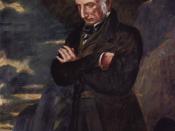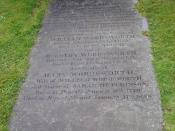Poetry was an outsider to the cold, efficient, emotionless environment of the Industrial Revolution. Romantics of all arts criticized the changing ways of life and idealized the pre-industrial revolution era. London was the haven to this revolution, and the hell to all poetry. William Wordsworth and William Blake both denounced London's new environment with their poems "London, 1802" and "London" respectively. Both authors were against this transformation of the city because it destroyed all beauty and happiness, both of which they were very fond of. But, their writings went about different ways of showing their feelings of dissent towards the mechanical lifestyle of London. In both poems, Blake and Wordsworth shared the idea that London was corrupted through the 'progress' brought on by modernization and more specifically, the industrial revolution. Although their ideas are similar, their means of conveying their ideas are not. Blake portrays his hatred of the situation of London by looking at the bleak modern times, while Wordsworth did so by looking to the past and how it was superior to the present.
Also, Wordsworth's use of a more visual representation of the London lifestyle contrasts with Blake's more auditory descriptions. Both of these authors had different styles, but one thing was certain in their writings, London was a despicable place.
London's condition in the early 19th century was no better than that of an impoverished land. The Industrial Revolution swept England by storm, and the upper classes were reaping the benefits while the lower classes suffered. London, it appeared, had lost all its values, morals, and emotion to the coldness of factory life and the selfishness of greed. Basically, London had been corrupted by capitalism, modernization, and the industrial revolution. Wordsworth depicts this loss of innocence very clearly in his poem. He uses reference to...



Good
Interesting analysis of both poems, well done, good comparison and examination of the period in which they were written.
2 out of 2 people found this comment useful.